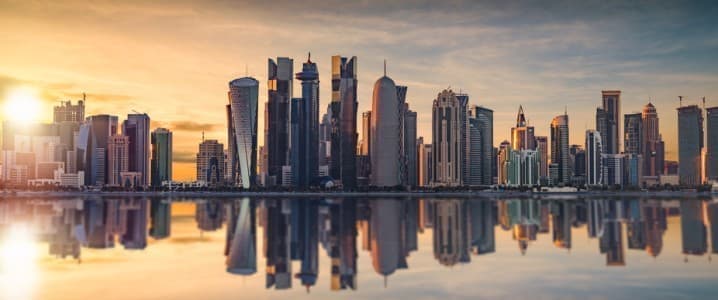Lower oil and gas prices this year and the end of last year’s massive spending before and during the World Cup have slowed down the economic growth in Qatar, one of the world’s top liquefied natural gas exporters, which is currently building the biggest LNG expansion project in history.
Qatar announced in 2021 the world’s largest LNG project, which is set to raise its LNG production capacity from 77 million tons per annum (mmtpa) to 110 mmtpa. When the North Field expansion is completed in 2026-2027, Qatar will have significantly higher LNG export capacity, which is set to boost export revenues and public spending.
Qatar is estimated to have spent around $220 billion to host the World Cup at the end of last year in what was the most expensive World Cup ever. Most of the funds were spent on hospitality, transportation infrastructure, and telecommunications.
With these amounts of spending now over, the Qatari economy slowed in the first quarter of 2023 compared to the fourth quarter of 2022, when the tournament was held.
Qatar’s quarterly gross domestic product (GDP) at constant prices rose by 2.7% in the first quarter of 2023 compared to the same period of 2022, Qatar’s Planning and Statistics Authority said this week.
However, compared to the previous quarter, when Qatar hosted the World Cup, the quarterly GDP shrank by 3.9%.
Lower international oil and gas prices also led to lower proceeds for the state and for spending. Oil and gas-related growth, the so-called mining and quarrying activities, was 0.3% in terms of real gross value added (GVA) in Q1 2023 compared to the fourth quarter of 2022. Non-hydrocarbon activities, on the other hand, saw a 6.3% decline quarter-on-quarter in the first quarter of 2023.
Qatar, one of the world’s top three LNG exporters alongside the United States and Australia, gets most of its revenues from gas sales, and the Gulf state’s long-term contracts are linked to international crude oil prices. So, volatility and a decline in energy commodity prices impact budget revenues.
LNG prices globally have sunk by 55% so far this year, following the record highs seen in August 2022 when Europe scrambled for supply after Russia cut off gas deliveries to most of its previous European customers.
Qatar’s economy this year reflects not only the lower global gas prices but also the lack of significant spending on major infrastructure projects after the World Cup ended.
Economists and analysts expect slower GDP growth for Qatar this year compared to 2022.
In April, BMI, a Fitch Solutions company, slightly lowered its projections for Qatar’s real GDP growth in 2023 to 2.3%, from 2.6% previously expected.
“Our revision is mostly driven by lower global energy price expectations, including gas prices in key LNG export markets, which will drive down government revenue and, hence, public investment spending,” the report said.
The International Monetary Fund (IMF) expects Qatar’s real GDP to grow by 2.4% in 2023, following 4.2% growth in 2022.
“After very strong growth in 2022 boosted by the World Cup, the economy is expected to normalize in the near term while the outlook remains relatively favorable,” the IMF said in May.
Real GDP growth is expected at 2–2.5% in 2023 and 2024 on robust domestic demand and the ongoing LNG expansion, with inflation moderating gradually to around 3%, the fund noted.
“Medium-term growth is likely to rise to around 4–4½ percent after the North Field expansion starts boosting LNG production. Aided by buoyant export revenue and public spending, the fiscal and external current accounts are projected [to] be in surpluses throughout the medium term,” the IMF concluded.
By Tsvetana Paraskova for Oilprice.com
More Top Reads From Oilprice.com:
- New Data Proves Nuclear Energy Is Safer Than You Think
- Is Central Asia The Next Flashpoint In A Warming World?
- Air Traffic Chaos Exposes Crisis In The Skies



















A case in point is that Qatar along with China were the only two countries in the world to emerge from the COVID pandemic in 2020 with positive economic growth. Another case in point is the Saudi-led siege against Qatar from which Qatar stood fast and managed to overcome it.
Qatar like all oil and gas exporters are affected by declining prices. But Qatar has the great advantage that it has already contracted its additional LNG production capacity well into the future years and the market is already showing signs of tightness and even shortages with prices projected to surge soon if there is a cold winter,
Now that crude oil prices are surging, Qatar will benefit significantly particularly that Brent crude is heading beyond $90 a barrel.
The global economy is expected to grow in 2023 at 2.7% so a growth rate of 2.7% by Qatar in the first quarter of 2023 is a starting point with Qatar projected to grow beyond 3% this year particularly with improving oil and LNG prices.
Qatar always emerges a winner, 2023 is in exception.
Dr Mamdouh G Salameh
International Oil Economist
Global Energy Expert